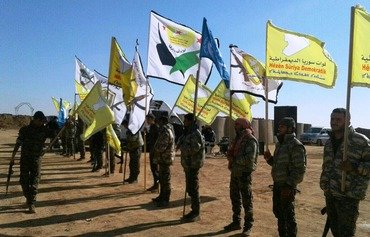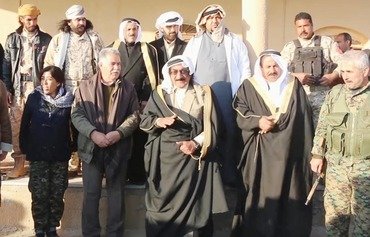Co-ordination between ethnic groups in northern Syria has directly impacted the progress of ongoing military operations against the "Islamic State in Iraq and the Levant" (ISIL), and the rumors of disagreements between the alliance are nothing but malicious attempts at sowing discord, northern Syrians tell Diyaruna.
ISIL’s lies are trying "to create the impression that a rift exists between Kurds and Arabs in the northern Syria region, aiming to disseminate the culture of blood and conflict not unlike ISIL itself", said Shervan Derwish, spokesman for the Manbij Military Council (MMC), which is part of the Syrian Democratic Forces (SDF).
Once Manbij is liberated, he said, the priority will be to build bridges and restore relations between community members by involving all groups in determining the makeup of judicial, administrative, legislative and executive institutions.
Syria's ethnic groups cannot be split apart because "that stage has been transcended through the blood of Kurds, Arabs, Syriacs, Chaldeans and Turkmens that is being shed to liberate Manbij from terrorism," he said.
The response to ISIL's lies, Derwish said, will come in the actions of the dignitaries and people of Manbij who are fully aware of the responsibility that will be laid on their shoulders to establish a society "based on the belief in a pluralistic reality and allowing all historical components to express themselves".
United against ISIL
"The relationship between the various ethnic components that make up the population of the northern Syria region is historic and excellent, and this outstanding relationship is particularly evident between the Kurdish and Arab components," said Alan Murad, an officer with the Kurdish People’s Protection Units (YPG).
"Despite all the counter-media campaigns that are trying to create the impression that problems exist between the two sides, the reality confirms the depth of this relationship, particularly with regard to fighting ISIL," he told Diyaruna.
He explained that the Arab-Kurd alliance has had an important role in the formation of the SDF and MMC forces, which have succeeded in regaining vast areas that were under the group’s control.
"The current events on the ground are the clearest and most powerful response to the untruthful media campaigns suggesting that the Kurds are trying to displace Arabs from northern Syria," Murad said, adding that Arab tribesmen fleeing ISIL were welcomed and taken care of in Kurdish areas.
In addition, Kurdish and Arab forces are working together to rid the region of explosives and mines left behind by ISIL so that all residents will be allowed to return safely to their homes, he said.
Tribes join fight
The decision by the tribes of Manbij and the surrounding area to back the MMC affirms the depth of the relations that they have with the Kurds, said Manbij tribesman Mohammed al-Hmeish.
He explained that "the concept of tribal and clan affiliation is the prevailing norm among Arab Syrians in northern Syria who follow their own laws that force all to adhere to one position and one decision".
The military alliance, therefore, in the Manbij, al-Bab and al-Jazira regions "is the strongest evidence of the tacit agreement among the region’s tribes to fight as one alongside the Kurdish forces represented by the YPG and Women’s Protection Units (YPJ)", he said.
The Harb tribe, one of the largest in the region, "made a clear announcement in June that it stands by the Kurdish forces in the fight against ISIL and asked all tribes to follow suit," he said.
Al-Hmeish, who is currently in rural Kobani where he recently took refuge with his family, told Diyaruna that the collaboration between Arabs and Kurds extends to the al-Raqa region where there are many allied military groups.
"Fighting and eliminating terrorism can only be [achieved] by forging strong relationships," he said.

![A Syrian Democratic Forces (SDF) Kurdish fighter gives water to a family fleeing areas controlled by the 'Islamic State of Iraq and the Levant'. [Photo courtesy of SDF Facebook page]](/cnmi_di/images/2016/07/26/5923-kurdish_fighter-_syria-600_384.jpg)





